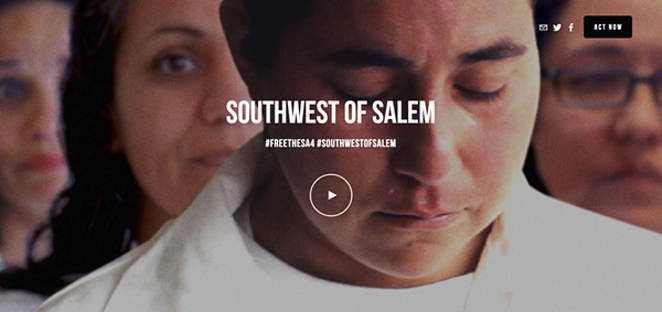A documentary following the dramatic case of four local women who say they were wrongly accused of gang-raping two children in the mid-1990s starts a weeklong run of screenings in San Antonio tonight.
Southwest of Salem: The Story of the San Antonio Four, which premiered at the Tribeca film festival earlier this year to rave reviews, will show at Alamo Drafthouse Village Westlake from September 16-22. The documentary by filmmaker Deborah Esquenazi has been drawing nationwide attention to the problematic prosecution of Elizabeth Ramirez, Cassandra Rivera, Kristie Mayhugh and Anna Vasquez, all of whom were handed lengthy prison sentences after being convicted of savagely assaulting Ramirez’s young niece in a series of bizarre rituals (see our 2012 feature story on the case and its implications).
The women, who each lost at trial after turning down plea deals that would have allowed them to avoid prison time, insist the abuse never happened. Attorneys who have since examined the case say the women never should have been prosecuted, let alone convicted, in the first place. Former Express-News journalist Michelle Mondo was the first to explore and highlight serious problems with the case.
The film’s producers have set up a number of screenings across the country just as the state’s highest criminal court gears up to decide what to do with the lingering criminal cases against the so-called San Antonio Four. This year, the Texas Court of Criminal Appeals faces the question of whether to agree with a lower court’s ruling that recommended sending the women’s cases back to trial.
Last year, Senior District Judge Pat Priest heard testimony that faulty forensic analysis helped convict the women. He also heard from one of the victims, Stephanie Limon, who recanted on camera for the documentary years prior. Esquenazi’s footage shows the woman nervously reading a prepared recantation from a sheet of paper, saying she lied about the allegations against her aunt and her friends. “I was threatened and I was told that if I did tell the truth that I would end up in prison, taken away, and even get my ass beat," the woman told Esquenazi.
In his opinion earlier this year, the local judge on the case admitted that new evidence “muddies the water” but doesn’t necessarily prove the women’s actual innocence, sending the case back to prosecutors for a new trial. Bexar County DA Nico LaHood has hinted that he won’t retry the women if the appeals court follows the lower court’s recommendation and sends the case back to prosecutors.
Still, Keith Hampton, one of the attorneys representing the women in their appeals, told us earlier this year that best-case-scenario for the San Antonio Four would be for the CCA to accept the case so he and other lawyers representing the women can argue for their actual innocence. “These women are actually innocent. They don’t deserve a retrial hanging over their head. They deserve compensation for all those years spent in a prison cell,” Hampton said.
The case seems to mean different thing to different people. Some look at statements made by prosecutors at the time about the women’s “homosexual relationships” as a sign the four women, all lesbians, never had a chance at beating charges they molested little girls in the much more conservative San Antonio of the mid-90s. Others see the case as the last gasp of the so-called “ritual satanic abuse” panic that gripped the nation in the 1980s and early 1990s (the doctor who examined the girls after their outcry, Dr. Nancy Kellogg, wrote in her exam notes that the abuse “could be satanic-related”). Hampton, who's represented other such cases, calls the satanic panic one of the most troubling periods in modern criminal justice history.
Local screenings on Saturday and Sunday will be followed by a Q&A with Vasquez, the first of the women to be released from prison in 2012. For more information on this week’s screenings, see drafthouse.com/san-antonio/show/southwest-of-salem.


